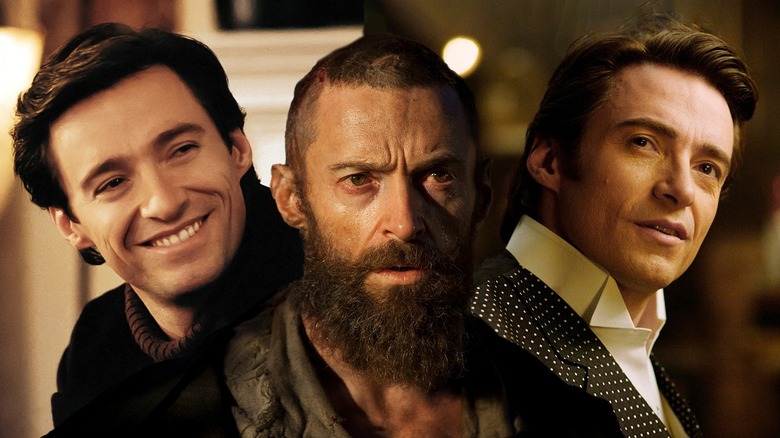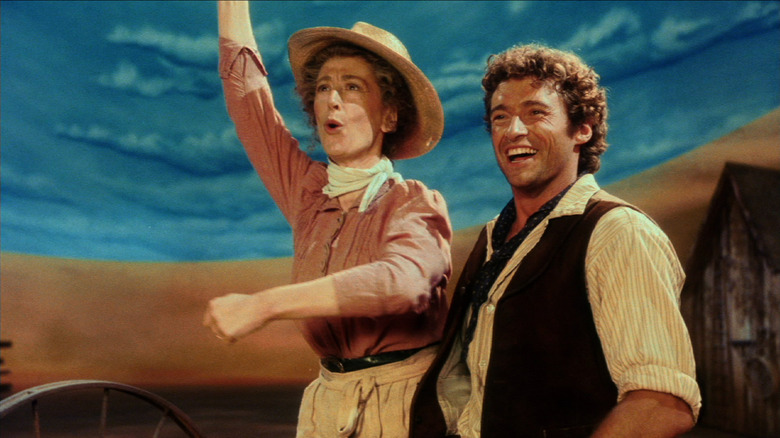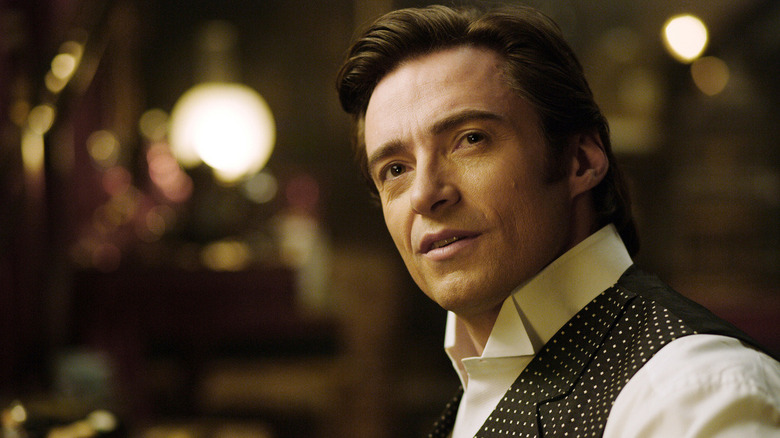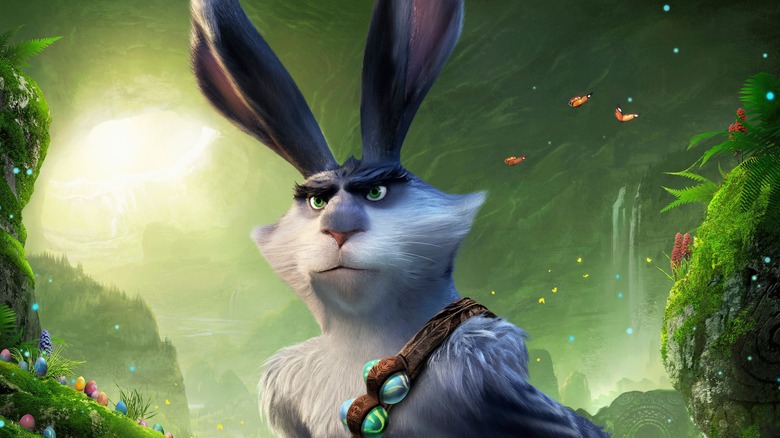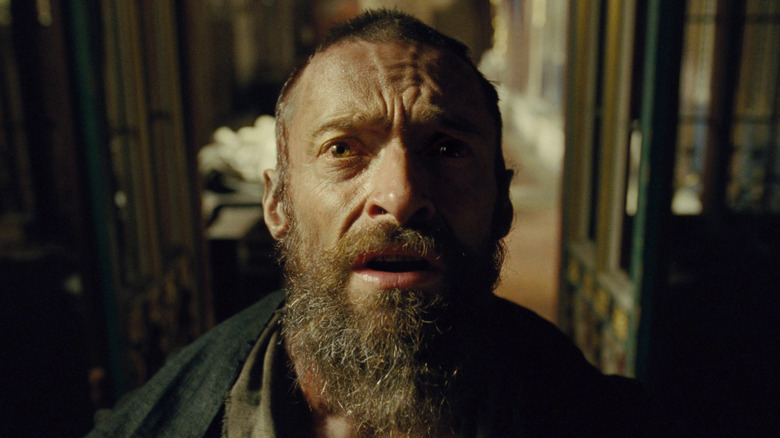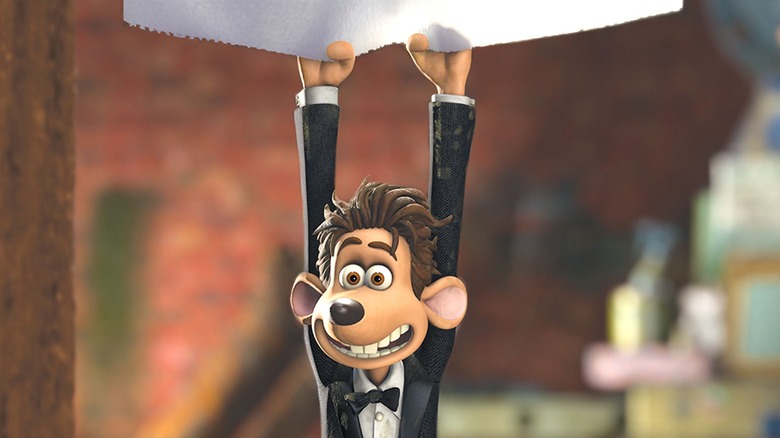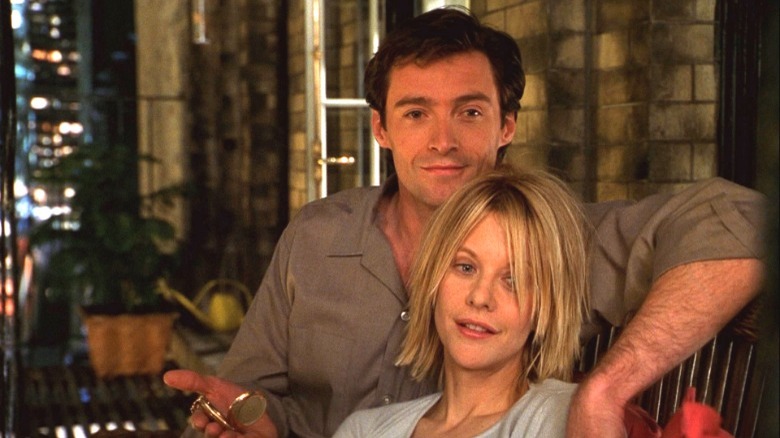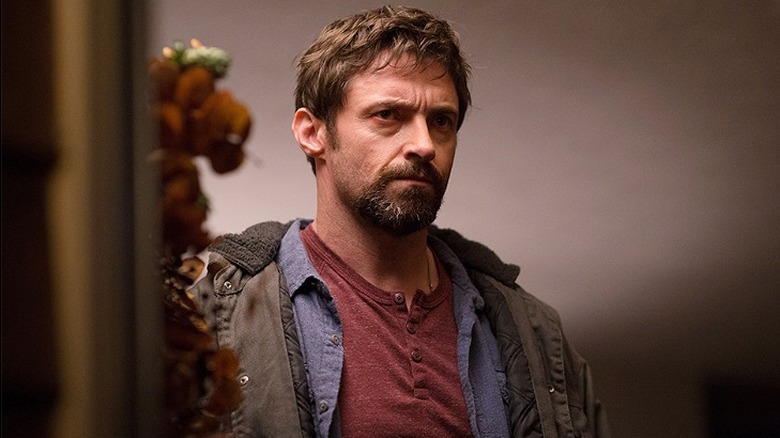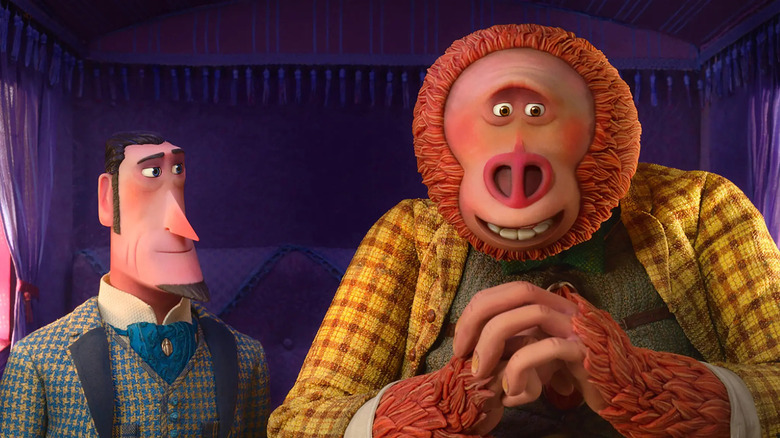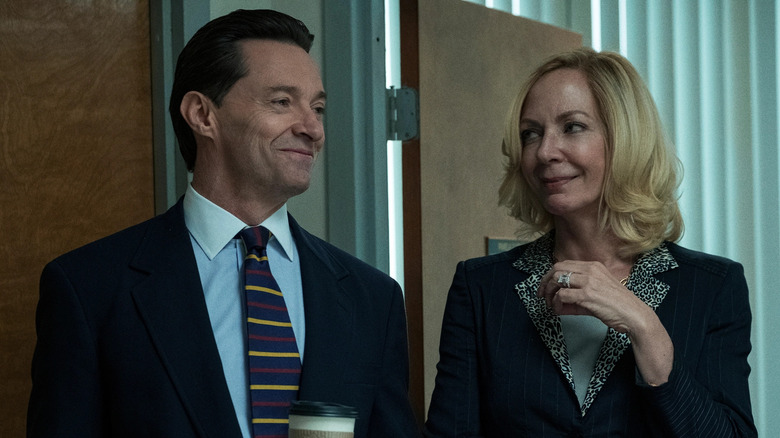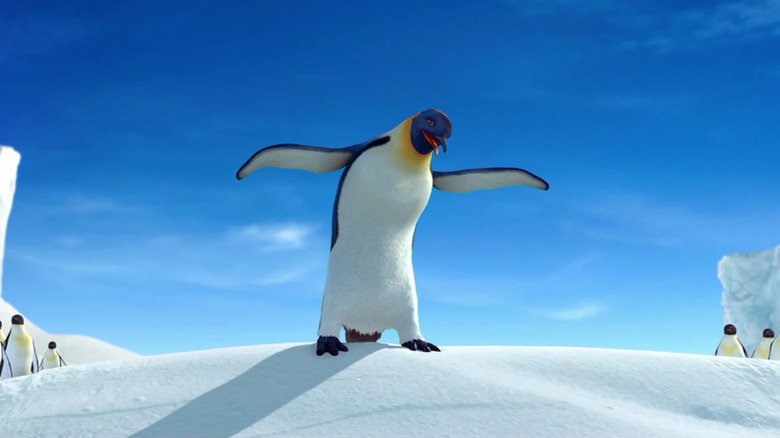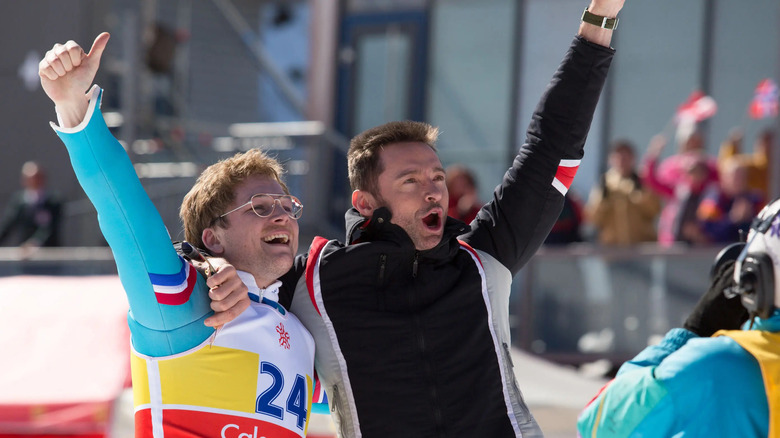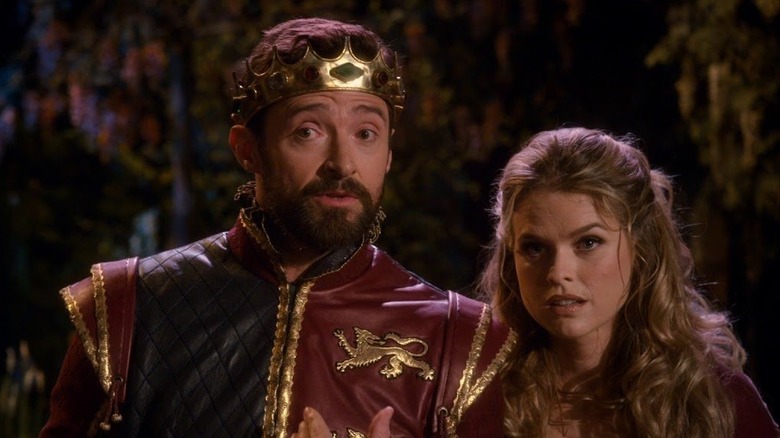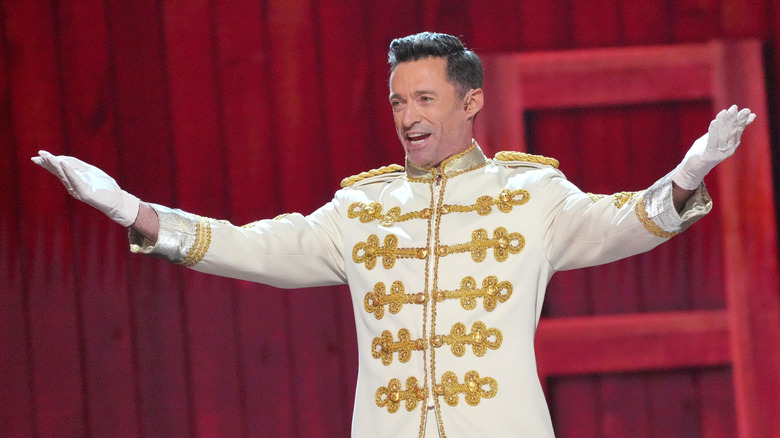The 13 Best Hugh Jackman Roles That Aren't Wolverine
If the box office of "Deadpool and Wolverine" was any indication, people love Hugh Jackman as Wolverine. The Australian actor had only a few film credits to his name before being cast as one of Marvel's most beloved comic book icons, but his ferocious portrayal redefined the character's place in pop culture forever. That being said, like how Wolverine has evolved throughout his many appearances, Jackman has several of his own dimensions as an actor.
Beginning his career in television and theater before hitting it big as a studio star, Jackman has played an incredibly diverse array of characters in many different genres. He has proven his prowess as a leading actor in comedies and dramas, animation and live-action, musicals and not-so-musicals. He has even managed to do something very few other actors have accomplished — hit it big as a superhero and then slowly morph into an awards contender. A lot of times it's the other way around, but revered dramas like "Les Misérables" and "The Son" only came after the initial fame and glory.
Clearly, Jackman can do it all, so it's worth recognizing some of this incredible work, bub. Let's take a look back at the best of Sticks' career, sans adamantium.
Curly (Oklahoma!)
Most people know Hugh Jackman as a Hollywood stud, but he actually got his start in show tunes. The Sydney native fell in love with acting through theater and took part in a number of Australian productions before ever stepping on a set. However, his first major role outside his home country was actually in London's West End, charming audiences as the handsome and hollerin' Curly McLain in 1999's revival of "Oklahoma!" Rodgers and Hammerstein's romantic, but violent, vision of the frontier was redesigned with more elaborate staging and more bombastic choreography that brought an old-fashioned show into the 20th century. It was nominated for several Olivier Awards, including for Jackman as best actor.
Jackman is the definitive Curly, imbued with a boyish charm that thinly veils a fragile masculinity, hopeless romanticism, and violent underbelly. His earnestness even subdues the character's treatment of Jud, which many modern audiences consider abject cruelty. After all, he does effectively recommend Jud kill himself for sympathy points. Still, Jackman is simply too genuine for the source material's dated material to poke holes. If all of that wasn't enough, he's also an extremely talented singer and dancer; the man vocally glides through Hammerstein's lyrics like nothing and even dances the dream ballet himself (in previous productions, a separate actor would portray Curly during the ballet). Luckily, the production was filmed and broadcast to audiences around the world, allowing everyone to see this star-making turn for themselves. No matter how many times Jackman dawns the adamantium claws, he will always be remembered for his contributions to the theater.
If you or someone you know is struggling or in crisis, help is available. Call or text 988 or chat 988lifeline.org
Robert Angier (The Prestige)
"The Prestige" often feels like the forgotten child of Christopher Nolan's storied filmography, which may explain why Jackman's performance as Robert Angier is treated similarly. Both men have had later projects that would overshadow the 2006 film, yet it's still some of the best work of their respective careers. Before Nolan became too confusing for his own good, his knack for crafting airtight plots was a sight to behold. Seemingly simple conceits became more engaging, multi-leveled puzzles for audiences to unlock as they kept watching. As more and more would be revealed, the characters would grow and change in ways that felt monumental.
Enter Robert Angier, an ambitious magician who enters a battle of one-upmanship with his co-worker-turned-rival, Alfred Borden. Jackman's performance begins fairly straightforward, charming if somewhat pompous. He's a showman who won't, in the words of the characters, "get his hands dirty." However, following the death of his wife at the hands of Borden (literally), he begins to do everything in his power to not only rise above him but destroy him. His descent into obsession becomes fully absorbing — you can see the absolute frailty in Jackman's face when Borden somehow outsmarts Angier, foiling his efforts again. However, it isn't until the end that the character's fervent facade is broken down. It was never about being better than Borden, but interrupting people's miserable lives with a moment of wonder. It's a heartbreaking moment that Jackman plays perfectly. It convinces the audience that, in the end, Angier may have won the day after all.
E. Aster Bunnymund (Rise of the Guardians)
Suck it, Hallmark. There's a new Easter Bunny in town, and he's from Down Under. DreamWorks' "Rise of the Guardians" reimagines many childhood symbols into majestic warriors, but no character is more emblematic of that than E. Aster Bunnymund, or Bunny for short. Under the direction of Peter Ramsey, who went on to helm "Into The Spider-Verse," this originally pagan creation is remarkably reborn as a humanoid rabbit-kangaroo hybrid. Instead of wistfully hopping about, this boomerang-wielding bunny gallops with a fierce pace and a brazen attitude. Producer Christina Steinberg described Bunny's design as "a cool and tough Australian ranger," which is such a daring and brilliant reinvention that the character immediately earns a spot on this list.
In an industry that has largely pegged Jackman as either American or British, this is one of the only times we ever get to see Hugh Jackman shine in his authentic Australian accent. It does wonders for Bunny, not only because the character himself is Australian, but because his sly personality is effortlessly evoked through the accent's cheeky quality. I mean, just listen to the way he says "You little ankle-biter." However, while Jackman's smooth delivery keeps the character entertaining, it's his breathless moments of vulnerability that sell the stakes of the story. One moment, in which a group of children suddenly do not believe in the Easter Bunny, is particularly memorable in contrast to Bunny's prior self-assuredness. Let's hope this Aussie gets more chances to shine in his default state.
Jean Valjean (Les Misérables)
Over a decade after its release, Tom Hooper's adaptation of "Les Misérables" still proves to be divisive. However, even fervent naysayers cannot deny that many of the film's central performances are incredibly powerful, one of them certainly being Jackman as Jean Valjean. Though Anne Hathaway would run away with the film's sole acting Oscar, many forget that Jackman was also nominated, and rightfully so. As the main protagonist, much of the story's emotional weight was firmly on Jackman's shoulders, and he carried it with the strength of Valjean himself.
We already knew Jackman had the chops to sing the music, but bringing a song to life on stage can be very different than on film, especially under Hooper's direction. Given the film's up-close and personal cinematography, much of the music's dramatic flair required a more subtle, internalized delivery that would complement the subtleties of on-camera performance. Jackman managed to not only add spontaneity to long-beloved show tunes, but he fully committed to the character's inner turmoil and anguish. For example, the song "What Have I Done?" may not feature the most visually inventive direction, but Jackman's immense heartache is enough to mesmerize despite that. Sure, not every note is perfect, but that was never the point. In blending singing and speaking, a more visceral performance far outweighs musical perfectionism. Even through the film's egregious green screen work and choppy editing, Jackman's performance in "Les Miserables" proved his prowess as not only a leading man but as a bonafide dramatic actor.
Roddy St. James (Flushed Away)
Of all the animated characters in Jackman's filmography, none are as dapper as Roddy St. James of Kensington, the posh and pampered pet rat from DreamWorks and Aardman's "Flushed Away." The companies' third collaboration is one that they would rather you forget — the film was such a difficult production and box office failure that it ended their working relationship – but there are plenty of redeeming qualities to be found in this wacky romp. It's got a bangin' soundtrack, a stacked voice cast, and an array of amusing pop culture references poking fun at everything from "Inspector Gadget" to "Terminator 2: Judgment Day." However, Roddy himself is one of its most enjoyable elements.
Loosely modeled as a genderswap of Audrey Hepburn's role in "The African Queen," Roddy is your traditional uptight fish-out-of-water (rat-out-of-water?), but you can also sense that the filmmakers took inspiration from slapstick comedy legends like Buster Keaton and Charlie Chaplin. His exaggerated movements through countless visual gags make him a comic delight throughout, but he isn't without his everyman charms. His memorable performance of "Ice Cold Rita" is one of the film's highlights, making use of Jackman's vocal abilities in a moment that grounds him in a natural likability. Jackman isn't even particularly recognizable as Roddy, often delivering squirms and screams in a higher register and a British accent. This isn't to say he's fully disguised, but it's not as blatant a "celebrity voice" as other animated cash grabs often implement. It may often go underappreciated, but Roddy is yet another wonderful voice role in Jackman's surprisingly eclectic collection.
Leopold (Kate & Leopold)
Long before James Mangold and Hugh Jackman redefined Wolverine, they first took a trip back in time ... and then to the future ... and then back in time again. Time travel movies have always been head spinners, but "Kate & Leopold" seems to have been forgotten in the surprisingly populated subgenre of timey wimey romcoms. Twenty years later, it remains one of the most refreshingly honest and genuine high-concept romances put to film. This is in large part thanks to Jackman's enchanting performance as Leopold, a 19th-century Duke who is transported to the present day after following modern man Stuart, played by Liev Schreiber, through a wormhole.
Unlike a majority of male romcom protagonists, Leopold strikes a delicate balance between larger-than-life period romanticism and surprisingly down-to-earth humanity. Jackman is fully committed to the hilarious juxtaposition of Leopold's Shakespearean affect in modern-day New York City. However, he never feels like a complete caricature. This is in part thanks to not only Jackman's strong presence but also Mangold's script, co-authored with Steven Rogers. Leopold's quieter moments of chivalry and care make him a far more grounded presence in this story than most other films in this genre would allow. You really believe he could adapt and begin to build a life with Kate, despite a years-long time difference. Maybe this is why the film's ending, as absurd as it is, feels like the logical conclusion. If Leopold can be a grounded man out of time, why can't Kate do the same? Time is a construct anyway. I'm sure it worked out fine.
Keller Dover (Prisoners)
Complete and total emotional devastation. Those are the only words that can describe the tour de force that is Hugh Jackman as Keller Dover in Denis Villeneuve's "Prisoners." The "Dune" director's English-language debut is a shocking, unnerving drama that fearlessly explores how loss and trauma break us down. Keller begins the film as a rock-solid father figure to his Pennsylvania family, devout in his faith with a survivalist mindset. However, he never could have predicted the abduction of his young daughter, along with his neighbors' daughter. It's an event that leaves Keller feeling utterly powerless, which doesn't bode well for a man who, for nearly his entire life, has been self-sufficient and protective. We witness his complete unraveling, from ruthlessly torturing suspected abductor Alex Jones to downing liquor after being sober for nearly a decade. It is this unrelenting, twisted portrait of perseverance that makes Keller, and "Prisoners" by extension, massively compelling.
For the many cinephiles who grew up with Jackman as Wolverine, this was the role that changed their perception of him. Logan was always a bit of an edgy figure, but Jackman's descent into unbridled rage and desperation as Keller was unlike anything he had ever tackled before. It showed us the depths this man could reach for full immersion into a character. In some ways, it feels like a precursor to "Logan," what many consider to be Jackman's magnum opus. Keller, too, is a distraught father figure who knows how to let out a frightening roar, he just doesn't need claws to leave you speechless.
Sir Lionel Frost (Missing Link)
Why look, another stop-motion animated Brit, only now it's an actual human being. How appropriate, given that "Missing Link" is all about what it means to be a man. Laika's gorgeous, globetrotting adventure is a deceptively complex journey for Sir Lionel Frost, a scientist whose discovery of the Sasquatch, aka Mr. Link, has the potential to grant him membership into a prestigious adventurers club. However, upon venturing to Shangri-La, he is forced to question not only his desire to be part of the club but the very nature of exploration and discovery. Children may miss it, but any adult can see the plot is a thinly veiled takedown of English colonization and white supremacy, on which Frost and his life work are inextricably based upon. Though "Missing Link" may be one of the beloved animation studio's tamer stories, the larger thematic subtext behind Lionel's arc makes it just as challenging.
On paper, Lionel Frost is already a very engaging character, but Jackman's voice makes it all the more effective. He is a man of many modes: suave and romantic, self-assured and forthright, caring and, as he puts it, altruistic. Jackson's lower register is a chameleon, going between all of these with ease. His bolder moments have the crisp, rich tone of other great British characters, but his quieter moments feel vulnerable and truthful. We never forget that, at the end of the day, Lionel is just a man, all thanks to Jackman's versatile vocal abilities.
Frank Tassone (Bad Education)
It really felt like 2019 was Hugh Jackman's year. After losing his first Oscar race to Daniel Day-Lewis, which is almost more of an achievement than winning, his stunning performance in Cory Finley's "Bad Education" was sure to rack him a second nomination and, finally, a win, right? Well, sadly, HBO would acquire the film shortly after its premiere at the Toronto International Film Festival, relegating it to a broadcast premiere and non-Oscar eligibility. It's a greater tragedy than maybe any Jackman has ever performed, which is saying a lot given that this darkly comedic film is also based on a true fall from grace.
Jackman portrays Frank Tassone, a Long Island school superintendent who was caught having embezzled millions of taxpayer dollars for personal use. Much of this included materialistic indulgences — cologne, sports cars, even plastic surgery — in order to maintain a pristine public image. However, underneath all of that was a closeted educator who was almost addicted to adoration. Jackman portrays this duality with such excellent control. The actor has a natural charisma embedded in his own public persona (making him perfect for the role), but he also knows where to show cracks in the foundation. The film's incredible "acceleration" monologue is one for the books. For example, you can see Frank losing his grip, but Jackman reins it in, nailing Mike Makowsky's airtight screenplay with conviction. It's such a brilliant turn that was largely ignored come awards time, but real ones will forever remember it as one of Jackman's best performances.
Memphis (Happy Feet)
Years before Austin Butler would get nominated for an Oscar, Hugh Jackman effectively played Elvis as a penguin. Memphis is certainly one of Jackman's stranger roles, but that's because "Happy Feet" is a strange movie. It's a jukebox musical about singing penguins that slowly morphs into a surreal environmental drama. Leave it to "Mad Max" madman George Miller to give us something thoroughly singular, including Jackman channeling his inner King of Rock 'n' Roll. Jackman's song-and-dance reputation surely made him perfect for the part — and who could resist pairing him with fellow Aussie Nicole Kidman — but I don't think any of us had Hugh Jackman covering "Heartbreak Hotel" on our 2006 bingo cards.
Memphis is certainly one of Jackman's more oddly memorable characters, but that doesn't mean he isn't well-written. If anything, he is just another tragic father figure in Jackman's filmography. Mumble grows up to be an outcast from penguin civilization, but this can be attributed to Memphis accidentally dropping his egg. Memphis naturally resents himself for it and projects his insecurities onto Mumble, creating a distant father-son relationship that leads to his exile. Jackman's vocal performance is heartfelt in his moments of crisis — even if it does feel like a bit of a Vegas Elvis impression — but it's the movie's gospel-esque passion that makes the pain feel so palpable. Eventually, of course, Memphis' walls come down and he discovers the beauty and connection of dancing in a stunning conclusion that Elvis himself would be proud to see.
Bronson Peary (Eddie the Eagle)
"Eddie the Eagle" is a film that lived up to its namesake; much like how many people took one look at Olympic ski-jumper Eddie Edwards and refused to give him the time of day, so too did audiences at the box office when his film was released. However, those who took a chance on Dexter Fletcher's sports biopic were treated to a delightfully funny, feel-good underdog story. Not only is Taron Egerton charming as Edwards, but Hugh Jackman gives an equally engaging supporting turn as Bronson Peary, a disgraced but prolific former ski jumper who begrudgingly agrees to train Edwards for the 1988 Winter Olympics in Calgary.
In a funny way, Peary is a natural extension of Jackman's Wolverine persona. He's a jaded, cocky loner with brushed-up hair and a penchant for drinks and cigarettes (Logan smokes cigars, but you get the idea). He even has pseudo-daddy issues after a falling out with her former coach, Warren Sharp, portrayed by Christopher Walken. However, Peary is more emotionally well-adjusted in the long run, resonating with Eddie's passion for proving himself. With this in mind, these were likely two of Jackman's easier shoes to fill, but he excels in the role regardless. He's spirited and off-the-wall in one moment, then tender and honest in the next, all without skipping a beat. Plus, there are only so many people who can make a VFX-soaked ski jump still look badass, but Jackman is one of them. When he flicks the cigarette? Chef's kiss.
Huge Ackman (Night at the Museum: Secret of the Tomb)
Many jokes have been made at the expense of Hugh Jackman's duality as a performer. Back when the "X-Men" films were still a novel concept, it was funny to see the Aussie slice and dice as Wolverine in one moment and then literally kick it with the Rockettes the next. We've all come to respect it nowadays, but that didn't stop the team behind "Night at the Museum" from poking fun. Jackman's cameo in "Secret of the Tomb" is short but sweet, making good use of his renowned stage career for a clever setup with many punchlines.
The franchise's third installment sees Sir Lancelot, played by the dashing Dan Stevens, coming to life for the first time within the London Museum. Striving to reach Camelot, he escapes the museum and seeks out the mythical city one evening after seeing a sign at the London Palladium. This is, of course, not actually Camelot, but the stage musical, "Camelot," as performed by Hugh Jackman and Alice Eve. It is them who must break it to Lancelot that Camelot is fictional, which naturally sends the Knight of the Round Table spiraling. Jackman's widely beloved persona clashes well with Lancelot's general unawareness, with one hilarious gag involving Jackman believing his kingly crown has an effect akin to Clark Kent's glasses. He even goes full Wolverine mode, hilariously so, to no avail. He fully sells his dim characterization, but props must also be given to Alice Eve, whose delivery of "he's doing his Wolverine thing" is one for the books.
Harold Hill (The Music Man)
Hugh Jackman may have broken out through Rodgers and Hammerstein, but his real song-and-dance origins are rooted in Meredith Wilson's "The Music Man," a popular piece from Broadway's Golden Age. Jackman auditioned for his high school's production when he was 14 years old, so determined to get a part that he memorized the show's entire opening number, "Rock Island" — a difficult patter song normally reserved for eight people — entirely by himself. After performing a piece of it on "The Tonight Show" over 20 years later, musical theater fans suddenly became enamored with the possibility of Jackman one day playing Professor Harold Hill, the show's leading man. It all came full circle in 2021, when "The Music Man" was revived to rave reviews and six Tony Award nominations, including one for Jackman.
After nearly two decades of redefining himself as a multi-faceted movie star, Jackman made a Broadway homecoming with the kind of showstopping starring role that gave him his career. His infectious charisma and comedic dexterity were at the center of the production's joyous energy, not to mention his limber dance moves and golden voice. His presence made the entire production feel like an event, as several of the production's standing ovations went viral. It all felt like a culmination of Jackman's star power, which is likely why his departure from the role, in anticipation of "Deadpool 3," led to the entire production closing after just over a year of performances. Considering a film remake of "The Music Man" is long overdue, let's hope this isn't the last we see of Hugh and Harold in River City.
